|
1.
CENTRAL AND WEST AFRICA
Rising demand for sawnwood
Reports suggest demand for azobe and bilinga logs has
weakened as there are fewer mills processing tropical logs,
especially in Europe. However, there has been a notable
rise in exports of sawnwood. Prices for sawn azobe and
bilinga remain stable following price declines over the
past few months. However, doussie sawnwood prices have
been rising which, say millers, is a paradox of low demand
paired with an even scarcer supply,.
It has been reported that in Belgium prices for adouk
sawnwood have slipped as there has been a surge in
shipments from Gabon and Cameroon, with Cameroon
adouk priced lower thanthe same species and
specifications from Gabon.
Reconstruction in Dubai - anticipated rise in demand
Prices in Asian markets are reported as generally stable.
However, demand for ovangkol is low as landed stocks are
higher than usual.
The pace of demand in Middle East markets is said to be
slow, as it has been for several months. Exporters in West
and Central Africa anticipate a rise in demand as
reconstruction begins after the recent disaster in Dubai.
Importers in India are showing interest in the azobe,
especially targeting low-quality timber. Producers say this
market is not attractive as they prefer to utilise falling
grade sawnwood internally for added value processing.
Extreme heat affecting working conditions
Cameroon is experiencing an unusually hot dry season
which is expected to last until June. Operators say supply
chains remain stable despite the harsh weather conditions.
In Gabon and Congo it is the rain season with
temperatures significantly higher than usual reaching
levels that impact the work environment. Millers in Gabon
face the additional problem of frequent electricity power
cuts which are severely impacting production, especially
kilning processes and plywood milling. The disruptions
are attributed to outdated infrastructure with promises
from the power company to resolve the problem by the
end of June.
Gabon National Convention reported in domestic
media
Media coverage in Gabon is predominantly focused on the
actions of the new government, especially following the
conclusion of the National Convention. This event has led
to the formation of special teams aimed at reorganising
government functions and this could influence future
policy directions impacting various sectors, including
forestry.
See:
https://www.lenouveaugabon.com/fr/gestion-publique/0205-20327-le-dialogue-national-inclusif-du-gabon-debouche-sur-1000-resolutions-visant-a-enforcer-la-democratie
Cheik Fantamady Kanté, World Bank Director of
Operations for Gabon commented that the National
Dialogue provided an opportunity to learn of the
government priorities and to see that these priorities are
well aligned with what the World Bank can support in
Gabon particularly with regard to providing basic social
services an the environment for job creation for young
people.
See:
https://www.gabonreview.com/projets-prioritaires-du-ctri-la-banque-mondiale-promet-son-appui/#respond
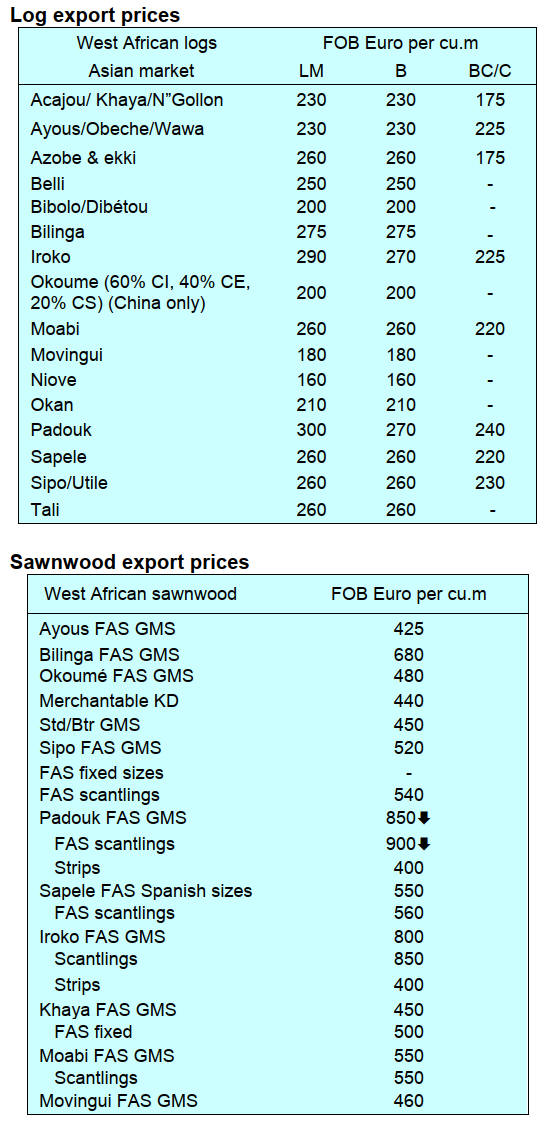
Through the eyes of industry
The latest GTI report lists the challenges identified by the private
sector in the Republic of Congo and Gabon.
GGSC
https://www.itto-ggsc.org/static/upload/file/20240515/1715738178173723.pdf
2.
GHANA
Forestry Commission issues deadline to its
debtors
The Ghana Forestry Commission (FC) has published a list
of debtors which include the names of individuals and
timber firms which owe the Commission money. The FC
website asked the debtors to settle their account by 31st
May 2024.
The statement says; “The Forestry Commission wishes to
bring to the attention of the following companies and
individuals whose names appear below to kindly settle
their indebtedness with the Forestry Commission by 31st
May, 2024. The Forestry Commission will resort to other
means within the law to recover all outstanding debts after
the deadline”. The list shows a total 530 individuals and
timber firms which own the FC money.
The statement adds “anyone who needs further
information or clarification could contact the
Commission’s Headquarters in Accra”.
See:
https://fcghana.org/forestry-commission-timber-firms-contractors-indebtedness/
Primary products 64% of wood product exports
Ghana’s primary product exports in the first 2-months of
2024 accounted for 64% of the country’s total wood
export volume (40,763cu.m), an 8% decline. In the same
period in 2023 exports amounted to 44,400cu.m.
Exports of secondary wood products accounted for 34% in
2024 against 33% in 2023.
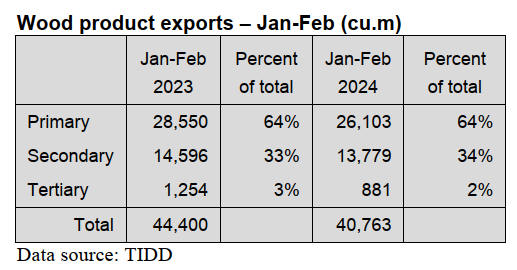
The exported primary products were air-dried sawnwood,
billets, teak logs, air-dried boules and kindling which
totalled 26,103cu.m in 2024 compared to 28,550cu.m in
2023.
According to the data from the Timber Industry
Development Division (TIDD) the average unit prices for
the secondary and tertiary products recorded increases in
early 2024 compared to the same period in 2023. Average
prices for primary products fell from Eur393/cu.m in 2023
to Eur384/cu.m in 2024.
The TIDD identifies some of the leading exporters for the
period as Samartex Timber and Plywood Company
Limited (9%), Miro Forestry Ghana Limited (7%),
Multimodal Freight Services Limited (6%), Logs and
Awnwood Limited (6%) and John Bitar and Company
Limited (6%).
The main species in demand were teak (49%), ceiba (8%),
wawa (8%), eucalyptus (8%) and denya (5%).
For the period under consideration India topped the list of
export destinations importing around 50% of the total
volume of wood products. While Germany (6%), Vietnam
(5%), Saudi Arabia (4%), US (4%) and others (31%).
Investors seek tax relief
Netherlands investors in Ghana, through the
Ghana/Netherlands Business and Culture Council
(GNBCC), have asked for the tax burden on businesses to
be reduced and asked for a streamlining of the
government’s regulatory processes to improve efficiency.
They also urged for ‘deepened digitalisation’ in public
service to address their exposure to corrupt practices in the
sector.
The statement on the GNBCC website says; “High
regulatory and compliance cost is identified as one of the
key cost components for the firms, and the synchronisation
of regulatory and permit processes leads to firms paying
extra costs through unofficial channels.
Thus, the government must deepen the existing e-
government services to ensure that the services are
delivered efficiently and reduce the cost of compliance.
This will help to reduce the bureaucratic interference of
public agencies in the activities of investors,” they
recommended during research sponsored by the GNBCC”.
A report on the findings of research conducted by the
IMANI Centre for Policy Education (CPE) was
disseminated to members of the GNBCC at the
stakeholder dialogue. The report is titled, “Reviewing
current economic and investment challenges and
opportunities for shared benefits and growth- a focus on
the members of the Ghana Netherlands Business and
Culture Council (GNBCC).”
According to a Senior Research Associate at IMANI/CPE,
Dennis Asare, a review of the existing tax regime was also
recommended by the respondents.
The GNBCC urged ‘deepened digitalisation’ in the public
service which would go some way to address exposure to
corrupt practices facing enterprises. The Council lamented
on the high regulatory and compliance cost in public
agencies as one of the key cost components for companies.
According to the GNBCC, the current macroeconomic
challenges have already increased the cost of doing
business for firms.
In a related development, the President of the Association
of Ghana Industries (AGI), Dr. Humphrey Ayim-Darke,
proposed that government should establish local
companies to compensate for the departure of
multinational corporations due to the high cost of doing
business.
In a reaction to these calls from businesses the Minister of
Finance, Dr. Mohammed Amin Adam indicated
government’s efforts to improve the business climate
outlining a series of initiatives aimed at making the
economy a preferred investment destination.
Businesses in Ghana are struggling with the high cost of
their operations, which range from port charges,
demurrage, taxes, high policy rate and depreciation of the
local currency among others.
See:
https://www.gnbcc.net/News/Item/7684
and
https://citinewsroom.com/2024/05/deliberately-establish-local-enterprises-to-replace-relocated-companies-agi-to-govt/
Importers suffer high port and handling charges
The Ghana Shippers’ Authority (GSA) organised a
workshop for importers following numerous complaints
from shippers concerning demurrage fees levied by
shipping lines and other handling charges from some
terminal operators.
Importers have long grappled with the burden of cargo
detention, demurrage and other charges stemming from
delays at the ports as this results in an unnecessary
financial burden.
To try and address these issues the GSA initiated steps to
establish Service Level Agreements (SLAs) with Shipping
Service Providers on behalf of shippers to promote
accountability within the shipping and logistics sector.
These agreements are expected to outline the obligations
of shipping service providers to shippers, streamline port
clearance processes, clarify time-related shipping costs,
offer guidance on cost avoidance strategies and delineate
the role of the GSA in this context.
The Chief Executive Officer (CEO) of GSA, Mr. Kwesi
Baffour Sarpong, announced these developments in a
speech read on his behalf during a workshop on “Avoiding
Demurrage and Rent” for Ministries, Departments and
Agencies (MDAs) held at the Shippers’ House in Accra.
See:
https://thebftonline.com/2024/05/06/shippers-authority-push-for-demurrage-free-port-through-strategic-engagement-with-mdas/
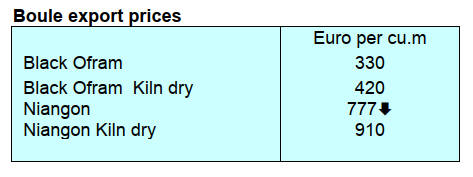
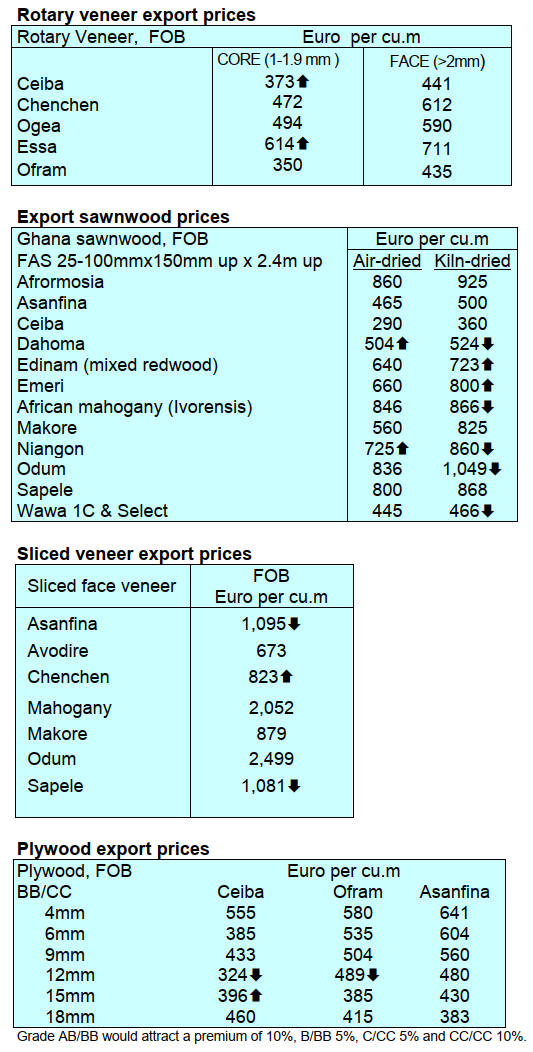
3. MALAYSIA
Inflation moderates
The Statistics Department’s latest consumer price index
(CPI) reveal that inflation remained at 1.8% in March
buoyed by higher prices for housing, water, electricity,
gas, services as well as transport.
Tightening forest degazetting and replacement
processes
Under the Malaysian Constitution, forestry is under State
jurisdiction. The National Forestry Act coordinates
forestry matters nationally and recently amendments to the
Act were passed.
Among the key changes were the tightening of the
degazetting and replacement process for permanent forest
reserves, the introduction of a public investigation process
before the degazetting of any forest reserve and the
simultaneous replacement of the degazetted forest.
The Natural Resources and Environmental Sustainability
Minister, Nik Nazmi Nik Ahmad, urged State
governments to adopt the amendments as, so far, only
Perlis and Selangor States have fully adopted the
amendments.
See:
https://www.thestar.com.my/news/nation/2024/04/30/more-state-governments-should-adopt-national-forestry-act-amendments-says-nik-nazmi
Efforts to bring deforestation levels down recognised
Free Malaysia, a news portal with a focus on Malaysian
current affairs, published a story in which it reports the
EU’s Commissioner for Environment and Fisheries,
Virginijus Sinkevičius, commended Malaysia’s efforts to
bring deforestation levels down.
It is reported that this comment was made during a virtual
conference with the Malaysian Minister of Plantations and
Commodities, Johari Ghani. Sinkevičius also reportedly
acknowledged Malaysia’s commitment to certified
sustainable commodity production.
“The EU and Malaysia will continue to work closely
together on the implementation of the forthcoming EUDR
and how the MSPO certification provides readiness and
assurances for supply chain partners and regulators in the
EU,” said a statement.
Johari emphasised the role of the Malaysian Sustainable
Palm Oil (MSPO) Certification Scheme in strengthening
efforts to meet EUDR requirements on traceability, being
deforestation-free and with legitimate land titles and good
labour practices.
Sinkevičius is reported as saying the EU is ready to
continue working with Malaysia to enhance deforestation-
free supply chains.
See:
https://www.freemalaysiatoday.com/category/nation/2024/04/25/eu-hails-malaysias-efforts-to-reduce-deforestation/
In related news, with the December 2024 implementation
of the European Union Deforestation Free Products
Regulation (EUDR) in mind the Malaysian Timber
Council (MTC) organised a webinar to provide updates to
stakeholders and equip them with the knowledge they
need to navigate through this regulation as well as
facilitate strategic and sustainable business approaches.
Efforts by the Government and MTC have been ongoing
to aid Malaysian timber exporters in satisfying the EUDR.
See:
https://mtc.com.my/images/publication/260/Timber_Malaysia_Jan-Mar_2024.pdf
Sabah forest revenue
The Sabah Forestry Department collected RM155.3
million in revenue in 2023. Of this RM93.3 was from
timber royalties and the proceeds from the collection of
inspection fees for exported wood products provided much
of the balance.
The revenue from permit fees, licence renewal fees,
royalties from agroforestry products, vehicle registration
fees and others was RM58.2 million.
See:
https://www.thestar.com.my/news/nation/2024/05/05/seeing-to-the-trees-for-proper-forest-management
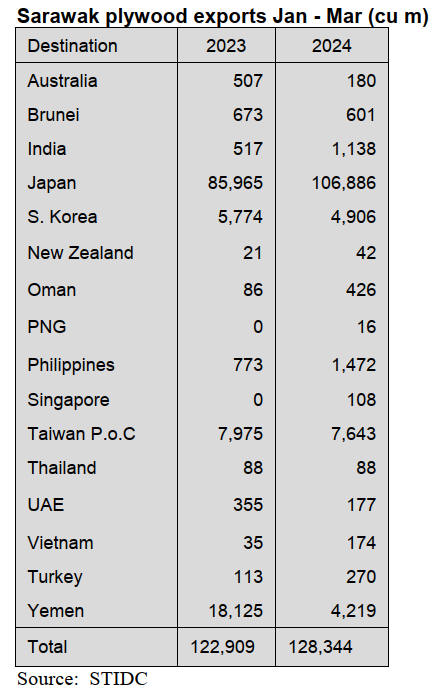
Through the eyes of industry
The latest GTI report lists the challenges identified by the private
sector in Malaysia.
GGSC
https://www.itto-ggsc.org/static/upload/file/20240515/1715738178173723.pdf
4.
INDONESIA
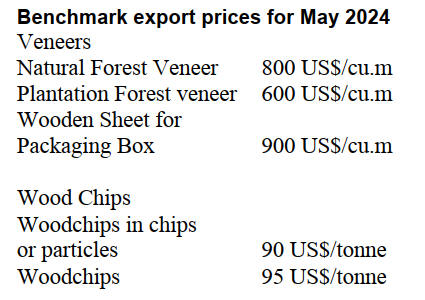
Processed Wood
Processed wood products which are leveled on all four
sides so that the surface becomes even and smooth with
the provisions of a cross-sectional area of 1000 mm2 to
4000 mm2 (ex 4407.11.00 to ex 4407.99.90).
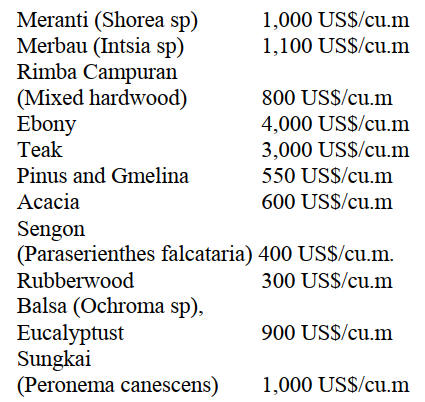
Processed wood products which are leveled on all
four
sides so that the surface becomes even and smooth with
the provisions of a cross-sectional area of 4,000 mm2 to
10,000 mm2 (ex 4407.11.00 to ex 4407.99.90)

Processed wood products which are leveled on all
four
sides so that the surface becomes even and smooth with
the provisions of a cross-sectional area of 10,000 mm2 to
15,000 mm2 (ex 4407.11.00 to ex 4407.99.90)

See:
https://jdih.kemendag.go.id/pdf/Regulasi/2024/575_Kepmendag%20HPE%20dan%20HR%20Produk%20Pertanian%20Lampiran.pdf
and
https://forestinsights.id/harga-patokan-ekspor-produk-kayu-mei-2024-ada-kenaikan-untuk-kayu-olahan/
Mission to discuss EU Forest Map data
The government will embark on a mission to discuss the
global forest map (GFM) on the European Union Forest
Observatory (GFM EUFO) platform which serves as a
reference for the European Union’s Deforestation-free
Regulation (EUDR) implementation.
Scrutiny by Indonesia has revealed accuracy issues with
the GFM EUFO. Acting Director General of Sustainable
Forest Management at the Ministry of Environment and
Forestry, Agus Justianto, explained that Indonesia’s
mission will be carried out through the Indonesian
Embassy in Brussels.
A comparison of the GFM EUFO map with the
SIMONTANA (National Forest Monitoring System)
reveals differences.
To strengthen Indonesia’s position in facing the challenges
from EUDR the Ministry of Environment and Forestry has
requested all holders of Forest Management Units (PBPH)
to overlay the EU’s GFM map with their PBPH maps and
PBPH Operational maps and check for variations. The
results of this analysis and ground check will be used for
negotiations with the European Union.
See:
https://forestinsights.id/indonesia-embarks-on-diplomatic-mission-to-rectify-eu-forest-map-reference/
and
https://www.antaranews.com/berita/4079901/ri-siap-jalankan-misi-diplomasi-koreksi-peta-hutan-acuan-eudr?utm_source=antaranews&utm_medium=desktop&utm_campaign=editor_picks
Countries seek changes to EUDR
The regulatory initiative developed by the European Union
the EU Deforestation-Free Regulation (EUDR) represents
a significant challenge for exporters to the EU.
While the modalities for implentation are not yet released
Indonesia, along with Malaysia and the EU, agreed to
establish an Ad Hoc Joint Task Force on the EUDR to
address various issues related to the implementation of the
EUDR. This task force will identify the best solutions and
resolutions regarding the implementation of the EUDR.
A bipartisan group representing the Republican and
Democratic parties in the United States has also
highlighted challenges and there has been consideration of
requesting a delay in implementation or changes to the
regulation.
See:
https://www.thejakartapost.com/business/2024/04/25/countries-including-us-seek-changes-to-eu-deforestation-regulation.html
and
https://finance.detik.com/berita-ekonomi-bisnis/d-7309525/ri-dapat-dukungan-dari-as-soal-protes-uu-anti-deforestasi-uni-eropa
Indonesia seeks 1% of global furniture market
Indonesian furniture exporters aim to capture 1% percent
of the global furniture market following a significant
decline in exports last year. In 2023, Indonesia's furniture
exports totaled US$2.1 billion, marking a 23 percent
decline from the previous year.
Global furniture sales are estimated to have reached
US$730 billion last year, with a projected increase to
US$766 billion this year according to the Indonesian
Furniture and Handicraft Industry Association, Asmindo.
The United States remains the largest export destination
for Indonesia's furniture, accounting for 55% of exports
with almost 70% being of wooden furniture.
In related news, the Chairman of the Indonesian Furniture
and Handicraft Industry Association (Himki), Abdul
Sobur, said that exporters are welcoming the strengthening
of the US dollar Indonesia uses 80-90% domestic raw
materials thus avoiding high priced imports.
Sobur said he is optimistic that export earnings from the
furniture, furnishings and crafts industries can grow by at
least 10% compared to the 2023 performance.
According to Sobur the industry is determined to explore
non-traditional markets outside of the European market
such as South Korea, China, Japan and ASEAN countries
while at the same time building capacity in order to meet
the EUDR requirements for exporting to Europe.
See:
https://www.liputan6.com/bisnis/read/5584534/ukm-mebel-indonesia-target-kuasai-1-pasar-perabotan-dunia?page=2
and
https://www.kompas.id/baca/english/2024/05/08/en-industri-mebel-optimis-ekspor-tumbuh-10-persen-tahun-ini?loc=hard_paywall
Singaporean firm invests in Batang Industrial Park
The Batang Industrial Park recently revealed that it had
attracted a US$25 million investment from Singapore.
Kawasan Industri Terpadu (KIT) Batang, also known as
Grand Batang City, announced that this investment came
from Singapore-based wood pellet producer Sampoerna
Kayoe. This also marked the first investment deal that the
industrial zone had secured this year. Sampoerna Kayoe is
planning to build a wood pellet plant in the Industrial Park.
See:
https://jakartaglobe.id/business/singaporean-firm-invests-25m-in-batang-industrial-park
Indonesia’s forest-based economy explained
Indonesia presented its forest management
accomplishments at the 19th United Nations Forum on
Forest (UNFF) and emphasised its commitment to
developing a forest-based economy. Alue Dohong, Deputy
Minister of Environment and Forestry reported that
Indonesia has successfully surpassed its national target of
reducing deforestation rates to below 0.45 million
hectares. Additionally, Indonesia has also committed to
achieving the target of social forestry allocation, which is
set at 12.7 million hectares.
Deputy Minister Alue also mentioned Indonesia's efforts
to develop a forest-based economy through community
empowerment in the public economic sector. During the
meeting the Indonesian Delegation participated in several
strategic discussions related to forest policy developments.
See:
https://ppid.menlhk.go.id/berita/siaran-pers/7709/indonesia-tunjukkan-komitmen-hijau-di-forum-hutan-pbb
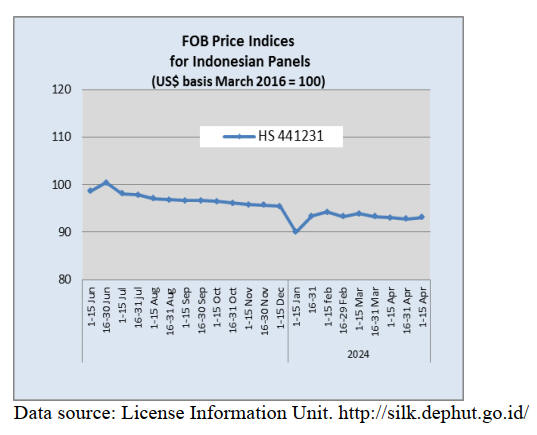
Through the eyes of industry
The latest GTI report lists the challenges identified by the private
sector in Indonesia.
GGSC
https://www.itto-ggsc.org/static/upload/file/20240515/1715738178173723.pdf
5.
MYANMAR
Soaring living costs – construction activity grounded
Persistent inflation is making life increasingly challenging
for people, especially for those with very low incomes.
The cost of essential goods continues to rise, primarily
driven by escalating fuel prices. Myanmar heavily relies
on fuel imports. According to the World Bank, fuel
imports accounted for almost 30% of merchandise imports
in 2022.
The surge in prices extends beyond fuel, affecting staple
items such as rice, meat, edible oils and vegetables which
have seen prices double or triple over the past year.
The implementation of the national military service law
earlier this year has prompted many young individuals,
predominantly males, to seek employment opportunities in
neighboring countries and this has led to a labour shortage
across various sectors. The construction sector has been
severely impacted by rising building material costs and a
labour shortage.
Construction materials are in short supply in Myanmar and
prices are rising. Many construction materials have to be
imported and companies are facing difficulties obtaining
the relevant import permits and foreign currency to
purchase materials.
The labour shortage is also the result of the conscription
law (National Military Service). On 1 May the government
suspended passport applications for those between the
ages of 23 and 31.
See -
https://myanmar-now.org/en/news/junta-lifts-suspension-of-overseas-work-permits-for-men-but-imposes-age-restrictions/
Informal diplomacy at work
The Japanese media (Nikkei Asia) has reported that
representatives of five ethnic groups, from Myanmar,
including the Karen National Union, the Chin National
Front and the Karenni National Progressive Party, were
granted permission to visit Japan. Nikkei Asia points out
that the Japanese government has avoided any official
endorsement of this visit.
It is reported the group may have met with representatives
of the Nippon Foundation, a philanthropic group headed
by Japan's special envoy for Myanmar, Yohei Sasakawa.
See:
https://asia.nikkei.com/Spotlight/Myanmar-Crisis/Thailand-Japan-signal-policy-shifts-on-engaging-Myanmar-s-resistance
Union Taxation Law for 2024-25
On 29 March 2024, Myanmar’s State Administration
Council enacted the Union Tax Law for the financial year
starting 1 April 2024 and ending 31 March 2025 (“2024
UTL”). The Union Tax Law has been issued annually
2014.
See:https://www.allenandgledhill.com/perspectives/articles/27910/mmkh-issues-union-tax-law-for-financial-year-2024-2025
New York Times reports on Myanmar
The New York Times issued a cover article “ What’s
Happening In Myanmar’s Civil War?” with comments on
the political, social and military situation in the country.
See:
https://www.nytimes.com/interactive/2024/04/20/world/asia/myanmar-civil-war.html
and
https://www.pbs.org/newshour/world/more-civilians-die-in-myanmars-civil-war-as-military-uses-brutal-tactics-against-resistance-gains
6.
INDIA
Election process imopacts
businesses
India's Parliamentary elections have been going on since
mid-April. The correspondent reports “production and
output in the timber and building sectors have slowed as
mill workers, carpenters and builders have taken leave and
returned home to cast their vote.
Once again, temperatures have soared across the country
and this is also affecting productivity. Because of the
extreme heat the risk of forest fires has increased.
Ocean freight charges and shipping opportunites have
become an issue for importers so they have reduced
imports.”
Domestic raw material costs rising
In its latest issue, Plyreporter discusses the increase in
poplar log prices. Plywood manufacturers in Northern
India, the main plywood manufacturing hub, have reported
soaring poplar prices. The industry reported an all-time
high in March when poplar timber prices rose to Rs1700
per quintal (100kg) that driven up production costs.
The main reason for the jump in raw material costs, says
Plyreporter, is the Red Sea shipping crisis that has pushed
up landed prices for imported wood pulp and paper mills
have turned to domestic poplar.
See:
https://www.plyreporter.com/article/153833/poplar-timber-prices-touches-new-all-time-high-mark
Wooden furniture gaining in popularity
India’s furniture industry is growing rapidly and almost
65% of Indian furniture is made of wood. The demand for
wood raw material in India’s furniture manufacturing
industry has increased. The interest in wood products in
the home has grown over the past few years as home
owners, especially young people stared to use wood for
interior decoration along with increased interest in wooden
furniture.
It has been estimated that the domestic Indian furniture
market will grow at a compound annual growth rate
(CAGR) of 13% between 2020 and 2024. Because of the
growing salaried class, the number of metropolitan
families and the rise in disposable income demand for
furniture is expected to continue to grow.
See:
https://www.indiatoday.in/information/story/what-are-the-future-prospects-in-the-furniture-industry-2508135-2024-02-28
Companies rebalancing their supply chains
The results of a poll of global business leaders undertaken
by Price Waterhouse Cooper says many are looking at
India and Southeast Asia as alternative supply chain
destinations as trade relations between China and the US
remain unsettled.
The poll, commissioned by Eastspring Investments, found
that over the next decade in the rank of supply chain
importance India will become the third most important
link, up from the current fourth and Southeast Asia will
also move up one place in the supply chain ranking. In
contrast, the poll determined Germany will move down
one place and Japan will drop to sixth.
According to the survey, boosting supply chain resilience
is a key business priority with most stating that
rebalancing their supply chain would cost less than the
potential risk by not rebalancing.
See:
https://www.pwc.com/gx/en/about/pwc-asia-pacific/global-supply-chains-the-race-to-rebalance.html
and
https://www.eastspring.com/assets/awp-23/docs/awp-download-report.pdf
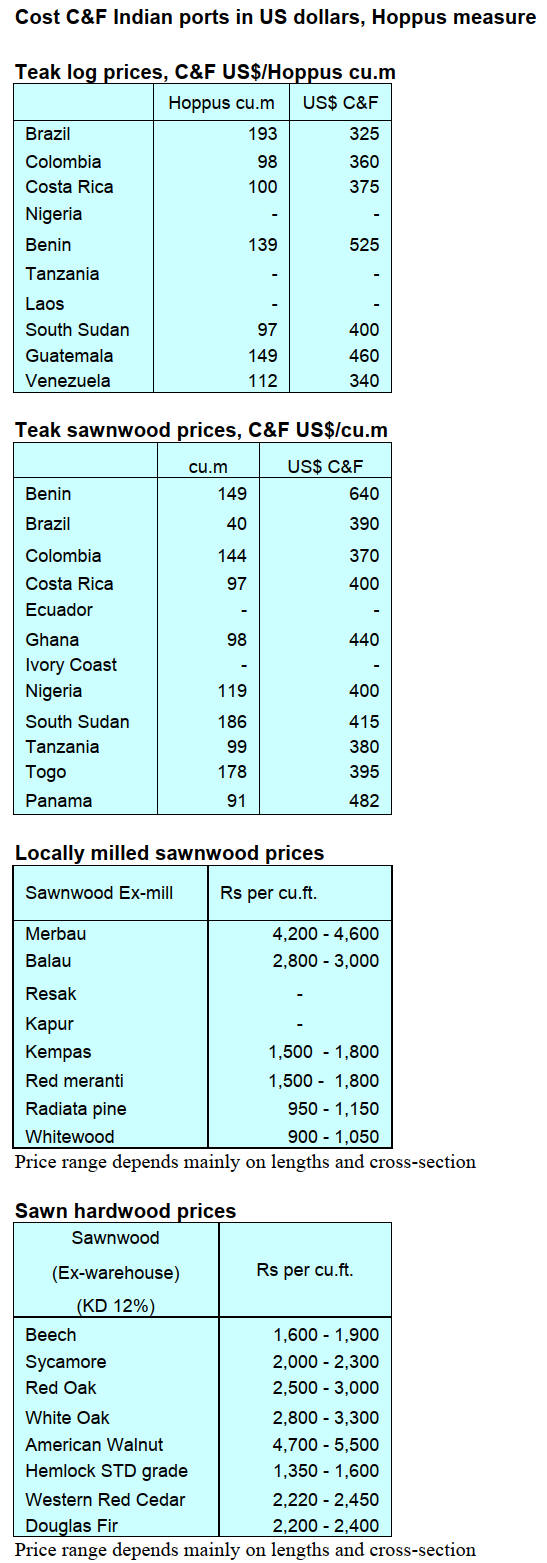 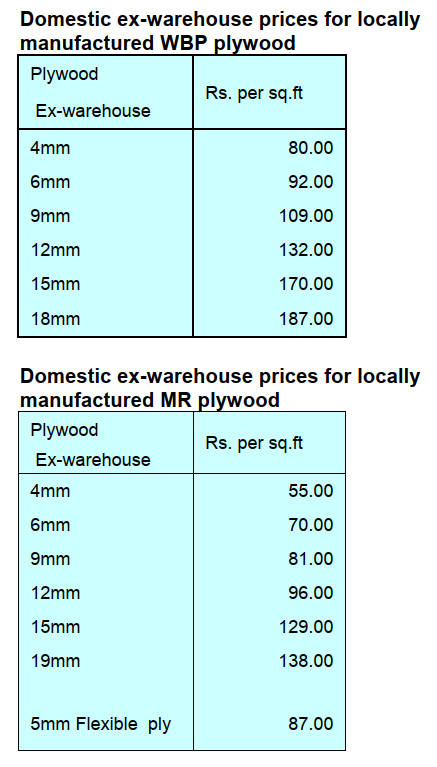
7.
VIETNAM
Wood and wood product trade highlights
Customs data shows that in April 2024 W&WP exports
reached US$1.3 billion, up 0.2% compared to March 2024
and up 19% compared to April 2023. WP exports
accounted for US$893 million, up 0.7% compared to
March 2024 and up 141% compared to April 2023.
In the first 4 months of 2024 W&WP exports earned
US$4.8 billion, up 24% over the same period in 2023. WP
exports alone, contributed US$3.3 billion, up 26% over the
same period in 2023.
Vietnam's W&WP imports in April 2024 amounted to
US$265 million, up 37% compared to March 2024 and up
57% compared to April 2023. In the first 4 months of 2024
W&WP imports were valued at US$801 million, up 26%
over the same period in 2023.
Vietnam's imports of logs and sawnwood in April 2024
reached at 498,200 cu.m worth US$166.9 million, up 38%
in volume and 37% in value compared to March 2024.
Compared to April 2023 imports of logs and sawnwood
rose 50% in volume and 39% in value. The increased log
and sawnwood imports in April 2024 resulted from the
increased demand from export manufacturers.
In the first 4 months of 2024 imports of logs and
sawnwood stood at 1,421 million cu.m worth US$472.5
million, up 12% in volume and 3% in value over the same
period in 2023.
In the first 4 months of 2024, the W&WP exports to
Canada totalled US$74.4 million, up 27% over the same
period in 2023.
In April 2024 exports of kitchen furniture brought in about
US$107 million, up 31% compared to April 2023. In the
first 4 months of 2024 exports of kitchen furniture totalled
US$397 million, up 34% over the same period in 2023.
Vietnam's poplar imports in April 2024 were at 44,000
cu.m worth US$14.4 million, up 38% in volume and 37%
in value compared to March 2024. Compared to April
2023 imports were up 46% in volume and 14% in value.
In the first 4 months of 2024, imports of poplar wood were
estimated at 108,800 cu.m, worth US$39 million, up 35%
in volume and 17% in value over the same period in 2023.
Imports of logs and sawnwood from the EU in April 2024
reached 50,000 cu.m at a value of US$16 million, up 13%
in volume and 3% in value compared to March 2024. The
total volume of wood materials imported from the EU in
the first 4 months of 2024 reached 184,020 cu.m, at a
value of US$59.40 million, down 3.5% in volume but up
2% in value over the same period in 2023.
Vietnam's wood export surged in the first four months
D.P.Tran, writing for vneconomy.vn, offers a valuable
insight into the current situation in the Vietnamese wood
processing sector. He writes “the success of Vietnam's
wood industry can be attributed to several key factors:
the country's strategic positioning as a global
exporter of wood and wood products which has
enabled it to expand its market reach
Vietnam's forestry development policies, business
support initiatives and an extensive network of
free trade agreements have provided a conducive
environment for the wood industry's growth
the abundant forest resources coupled with its
competitive labour force and access to raw
materials has bolstered export competitiveness
the wood industry has embraced technological
advances, digital transformation, investment in
product development, process optimisation and
productivity enhancements
Despite its recent recovery the industry faces considerable
hurdles as Vietnam's primary export markets tighten
regulations regarding the origin and legality of wood
products”.
He emphasises that enterprises need to comply with
environmental regulations and traceability standards and
advocates increased investment in design, creativity and
product innovation which will create opportunities for
diversifying export markets.
See:
https://vneconomy.vn/vietnams-wood-export-surges-23-7-in-first-four-months-of-2024.htm
Imported raw material sources
In the first quarter of 2024 the area of newly planted
forests nationwide amounted to 37,300 hectares, down
1.4% over the same period last year due to heavy rains
badly affecting the progress of afforestation in selected
localities.
In the first 3 months of 2024 imports of logs and
sawnwood from major suppliers such as China, the US,
Thailand, Laos, Chile and Brazil increased against the
same period in 2023. In contrast, imports from some other
suppliers such as the EU, Cameroon, Malaysia and Congo
decreased.
In particular, log and sawnwood imports from China
accounted for 16% of total imports in the first 3 months of
2024, reaching 165,200 cu.m, worth US$63.4 million, up
56% in volume and 23% in value over the same period in
2023.
The imports from the US increased by 37% in volume and
35% in value year-on-year reaching 142,800 cu.m, worth
US$61.4 million equivalent to 13.5% of the total imports.
Imports from Thailand soared by 36% in volume and 45%
in value over the same period in 2023 reaching 129,300
cu.m, worth US$27.0 million, accounting for 12% of total
imports.
In addition, imports of logs and sawnwood from some
other markets increased compared to the same period in
2023 such as from Laos, up by 12%, from Chile up by
55%, from Brazil up by 103%, from Papua New Guinea
up by 141% and from New Zealand up by 8%.
In contrast, log and sawnwood imports from some other
sources in the first 3 months of 2024 declined over the
same period in 2023 such as from the EU down by 0.2%,
Cameroon by 53%, Malaysia by 34%, Congo by 47% and
Suriname by 40%.
Imported species
In the first 3 months of 2024 imports of pine, poplar, oak,
eucalyptus and walnut increased against the same period
in 2023 while some of the other species, including ash,
tali, pachy (white afzelia) padouk, rubberwood and teak
declined.
Imports of pine, the main timber imported, accounted for
15% of total log and sawnwood imports in the first three
months of 2024 reaching 161,800 cu.m and worth
US$34.4 million, up 60% in volume and 51% in value
over the same period in 2023.
Poplar imports surged in the first three months of 2024 by
53% in volume and 38% in value over the same period in
2023 reaching 76,700 cu.m, worth US$28.5% million
equivalent to 7% of total imports.
Oak imports increased by 43% in volume and 48% in
value over the same period in 2023, reaching 74,100 cu.m,
valued at US$42.8 million.
In addition, imports of some other species increased
against the same period in 2023 such as eucalyptus, up by
207%, sapelli, up by 19%, walnut, up by 50%, beech up
by 27% and fir up by 72% etc.
In contrast, imports of ash in the first 3 months of 2024
decreased to 86,200 cu.m, worth Ú$22.5 million and ,
accounted for 8% of total wood raw material imports.
In the first 3 months of 2024, the average import price of
logs and sawnwood stood at US$331.5/cu.m, down 9%
over the same period in 2023.
In particular, the price of logs and sawnwood from China
fell 22% over the same period in 2023 to US$383.6/cu.m,
from the US prices fell by 1.5% to US$430.0/cu.m, from
Laos prices fell by 7% to US$459.2/cu.m, from Chile
prices fell by 6% to US$233.8 per cu.m. and from Papua
New Guinea prices fell 4%.
Outlook of Vietnam’s timber imports
Exports of wood and wood products in the first 4 months
of 2024 have shown positive signals thanks to the increase
in imports by key markets.
The recovery in the first months of this year has
enabled wood enterprises to increase production and given
positive expectations for Vietnam's wood industry for
2024. In particular, demand recovery in major markets
such as the US, China, Canada, the UK and the EU has
brought cheer to Vietnam's wood product
manufacturers.
Wood processors have accelerated linkage with farmers
along the supply chain, focusing on investment in and
development of large timber plantations to secure raw
materials. Due to the lack of many species required by
customers Vietnam’s wood industry still depends on
imported wood raw material.
See:
https://english.haiquanonline.com.vn/wood-exports-started-well-29702.html
Woodchip exports and impact on the pulp sector
Vietnam’s exports of eucalyptus and hybrid acacia
chips have increased more than 10 times in the last
decade. In 2001, the country exported only 400,000
tonnes of wood chips but by 2011 it had increased this
to about 5 million tonnes.
The expansion of pulp capacity in China has led to a
sharp increase in the number of hardwood plantations
and chip making facilities in Vietnam. Chips are mainly
exported through the Hai Phong Port area and via ports
in Central Vietnam. At many ports in Central of
Vietnam such as Ky Ha (Quang Nam), Dung Quat
(Quang Ngai), Chan May (Thua Thien Hue), there are
regular bulk carriers. The export markets are S. Korea,
Japan and China. With limited domestic supply China
will continue to rely on neighboring countries to
provide chips for pulp production.
A representatives of Dak Lak agroforestry farmers
group said that, due to the lack of capital, they had to
exploit trees early to cut sawn timber for export instead
of planting several years for higher value sawn timber.
One ton of wood in the market costs 500,000 VND,
while one ton of sawn timber costs four times as much.
The massive export of wood chips does not only affect
the demand for wood materials and pulp materials in
the future but also affects the wood processing and
paper industries.
According to Vu Ngoc Bao, General Secretary of the
Vietnam Pulp and Paper Association, paper mills in the
country have to import raw materials at high prices
while the export price of wood chips in Vietnam to
China and Japan is much lower.
Despite the huge amount of wood chips exported the
value of exports is only about US$300 million but the
amount spent to import pulp amounts to US$700
million per year.
Recently, An Hoa Paper Joint Stock Company (An Hoa
Paper) proposed to increase the export tax on chips to
create conditions for production of pulp from domestic
raw material. Bao, leader of Paper & Pulp Association
supported the idea from An Hoa Paper.
In response forestry companies and forest planters are
opposed to the paper industry suggestion and the Binh
Dinh FPA Company has written a petition to the
Ministry of Industry and Trade, Ministry of Agriculture
and Rural Development, General Department of
Forestry and the Wood asking that no changes be made
to export duties or chip exports.
See:
https://www.paper-vietnam.com/en/news/vietnam-the-worlds-largest-exporter-of-wood-chips-and-its-impact-on-the-pulp-market-2-99.html
8. BRAZIL
Debate on railway
logistics for exports
Representatives from industry and organisations that use
the railway to transport goods for export, along with
experts in the field, system operators and regulatory
agencies recently participated in a meeting organised by
the Brazilian Association of Mechanically Processed
Timber Industry (ABIMC) to discuss solutions for export
logistics focusing on the railway network.
The main objective was to address the need for
harmonisation among the various channels involved in
export logistics and to seek optimal product flows, taking
into account industrial growth and challenges facing the
logistic infrastructure.
During the meeting the condition of logistic infrastructure
was analysed, especially regarding the railway system, in
order to plan effective short, medium and long-term
actions to mitigate current bottlenecks.
The meeting featured presentations of studies addressing
the volume and movement of cargo in different modalities
emphasising the importance of an integrated perspective
(loading, arrival at the port and shipment) to understand
logistic challenges.
Additionally, the National Railway Transportation
Department of the National Land Transportation Agency
highlighted the need to bring railways into a more
competitive national context by seeking investments from
both the public and private sectors to improve railway
infrastructure.
See:
https://abimci.com.br/abimci-participa-de-reuniao-para-debater-panorama-do-modal-ferroviario/
Discussions on forest policies between Brazil and
Bolivia
Representatives from the State government of Acre and
Bolivian Governors met in April to discuss forest policies
for the Amazon Region, including conservation and
sustainable development strategies.
The Governors' Climate and Forests Task Force (GCF
Task Force) led the meeting which involved local leaders,
subnational government communities and project
financiers linked to sustainability in order to exchange
experiences and explore effective policies.
The government of Acre highlighted successful cases such
as environmental regularisation and projects such as the
Biotechnology Park, aimed at boosting the local economy
based on biodiversity and sustainable production, aligning
with the Amazon 2030 agenda and strengthening
cooperativism to promote development.
During the meeting innovative approaches on forest
management, climate mitigation, combating deforestation
and biodiversity preservation were discussed, including
the incorporation of indigenous knowledge.
The government of Acre also emphasised its leadership in
creating specific programmes, setting goals and incentives
to mobilise local and regional resources for climate
initiatives. These actions have attracted private
investments and strategic partnerships such as the Amazon
Fund worth almost R$100 million and strengthening the
regional commitment to sustainability and socio-economic
development.
See:
https://forestnews.com.br/acre-bolivia-discutem-politica-florestal/
International Coalition seeks transition period for
EUDR implementation
The international coalition "On Sustainable Timber," made
up of various timber-producing countries, including Brazil
represented by ABIMCI, sent documents to the European
Commission requesting clarification on some legal issues
and an acceptable transition period to ensure greater
effectiveness in the implementation of the EUDR which
will come into effect in December this year.
Additionally, ABIMCI is mobilising representatives from
the forest industry and the Ministry of Agriculture,
Livestock and Supply (Mapa) to determine how the
federal government can address the issue of EUDR
implementation.
ABIMCI is also discussing technical issues, conformity
assessment, risk assessment and classification in Brazil,
system operation and data security, certification of origin,
geolocation, inspection and sanctions among others.
The EUDR establishes rigorous due diligence
requirements for the importation of products by the
European Union. The document sent to the European
Commission seeks to clarify key terms in the regulation,
such as forest, forest plantation, planted forest,
deforestation and forest degradation, which are not yet
fully defined.
In addition, coalition members held a meeting to discuss
challenges faced by timber-producing countries. The
group is considering a possible in-person agenda with the
European Commission to present the position of
participating countries regarding the EUDR.
The International Coalition has also developed a Timber
Coalition website where the documents addressed to the
EU are available.
See:
https://www.timbercoalition.org/_files/ugd/b764c2_028f19e7c2a9452a9c294b1b40cd42e9.pdf
and
https://bioenergyeurope.org/wp-content/uploads/2024/03/Joint-cross-sector-coalition-letter-on-EUDR-implementation.pdf
France a target market for Brazilian furniture
The French furniture market stands out as one of the main
destinations for Brazilian exports according to the "Study
of Opportunities for the Brazilian Furniture and Mattress
Exporter - Target Country: France."
With a sophisticated logistics infrastructure and a strategic
position in Europe France offers significant opportunities
for the Brazilian industry. The study suggests the steady
growth of apparent furniture consumption in the country,
reaching US$14.2 billion in 2022 (a 3.4% increase since
2018) highlights the growing dependence on imported
products.
French demand for quality furniture, innovative designs
and sustainability provides a window of opportunity for
the Brazilian furniture industry which has shown signs of
recovery and growth in the French market.
With a 42% increase in furniture export to France in 2022
compared to the previous year, Brazil is well-positioned to
meet the demands of the French market, especially
considering the recent strengthening of diplomatic
relations between the two countries.
However, to capture the opportunity in the French market
and achieve a projected growth of +33% (US$37.6
million) in the short-term continuous investment in
quality, innovation and sustainability will be crucial.
See:
http://abimovel.com/relacoes-bilaterais-fortalecidas-e-alta-demanda-por-importados-fazem-da-franca-mercado-alvo-para-a-industria-brasileira-de-moveis/
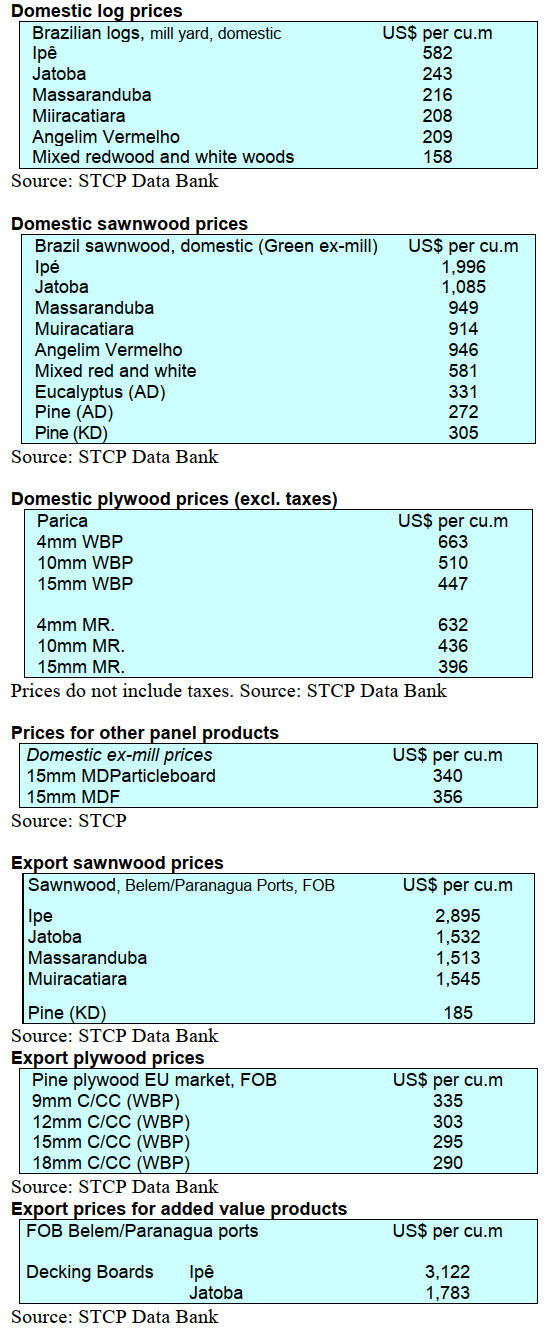
Through the eyes of industry
The latest GTI report lists the challenges identified by the private
sector in Brazil.
GGSC
https://www.itto-ggsc.org/static/upload/file/20240515/1715738178173723.pdf
9. PERU
Veneer and plywood
exports suffer a decline
The Management of Services and Extractive Industries of
the Association of Exporters (ADEX) reported that export
shipments of veneers and plywood in the first two months
of this year earned US$107,000, a decline of 10% year on
year.
This drop is partly explained by the decline in orders from
Mexico, the main buyer. According to figures from the
ADEX Data Trade Commercial Intelligence System no
other country placed orders for these products in the first
two months of this year.
Promoting compliance with regulations among forest
users
With the aim of promoting compliance with forestry
regulations and strengthening the sustainable use of forest
resources, the Forest and Wildlife Resources Supervision
Agency (OSINFOR) held three workshops in April to
explain forestry regulations to Brazil nut (locally termed
chestnut) concessionaires in the Provinces of Tambopata
and Tahuamanu, in Madre de Dios.
The workshops brought together those involved in
sustainable forest management, from Brazil nut concession
holders, forest agents, public authorities and
representatives of environmental organistaions.
With the support of institutions such as the Specialised
Prosecutor's Office for Environmental Matters (FEMA),
the Association of Forest Regents of Madre de Dios
(AREFOMAD) and the Regional Forestry and Wildlife
Authority of Madre de Dios, participants had the
opportunity to update their knowledge on rights, duties
and responsibilities in forestry matters.
See:
https://www.gob.pe/institucion/osinfor/noticias/946858-osinfor-promueve-el-cumplimiento-de-la-normativa-forestal-entre-usuarios-del-bosque-en-madre-de-dios
Meeting of international and national experts at
forestry forum
The Sustainable Productive Forests (BPS) programme of
the National Forestry and Wildlife Service (SERFOR) and
the Regional Government of San Martín recently hosted
an International Forestry Forum themed “Favorable
environments for innovative and sustainable forestry
businesses in Peru”. The aim was to exchange experiences
on forest plantations for commercial purposes, forest
management and forest planning.
The forum brought together national and
international
experts from Colombia, Ecuador, Brazil, Chile, the
Caribbean and the United States who explained the
challenges, successes and good practices in forest
plantations implemented in their countries. As part of the
forum the first invitation for Peru’s innovative co-
financing mechanism, the Forest Incentives Program (PIF)
was opened.
See:
https://www.gob.pe/institucion/serfor/noticias/944414-san-martin-serfor-reune-a-expertos-internacionales-y-nacionales-en-foro-forestal
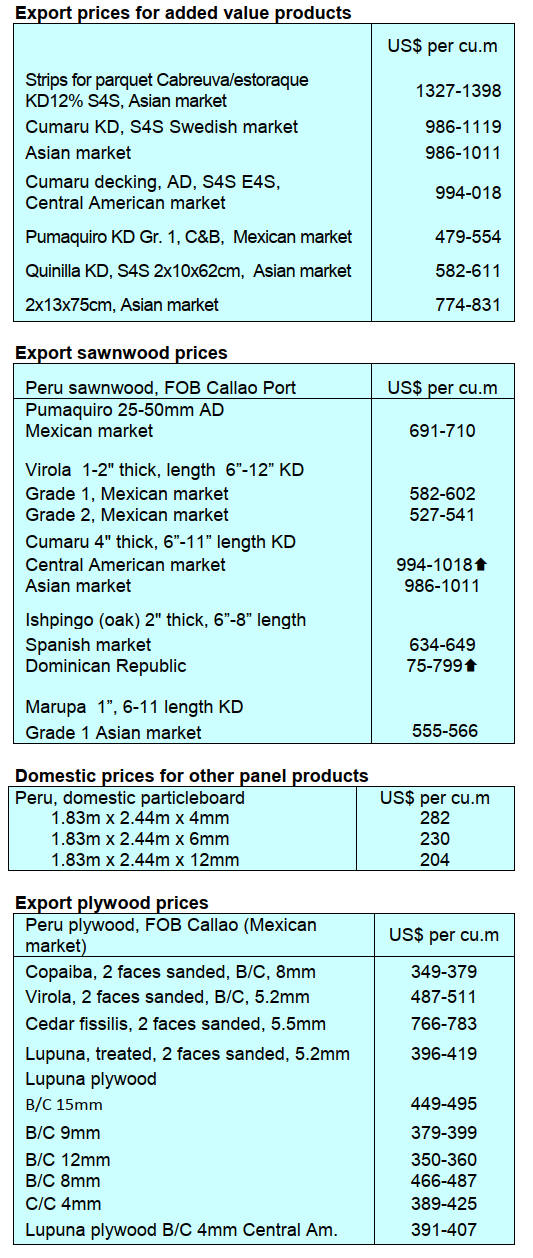
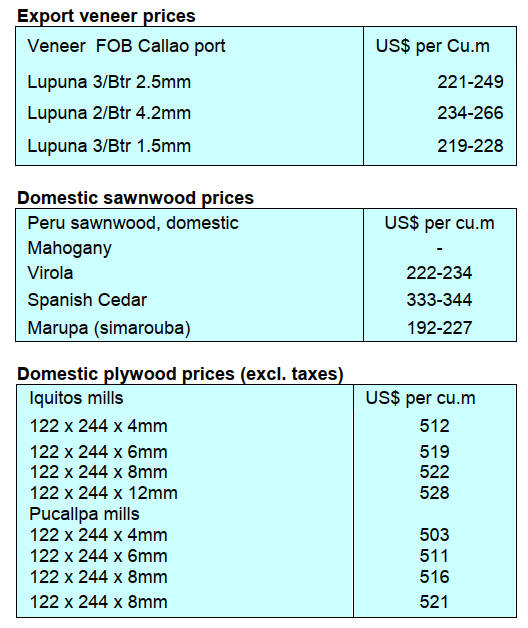
|